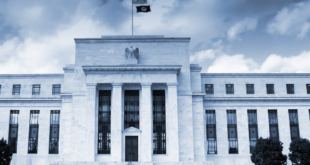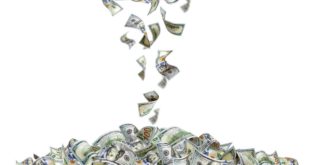In March, at the National People’s Congress, Beijing set its annual gross domestic product (GDP) growth target. Since 1985, in every year but one, China has met or exceeded its official projections, raising doubts about whether or not Beijing’s claims of rapid growth can be believed. The New York Federal Reserve issued a report in 2020 that challenged the numbers, saying that China’s GDP growth chart was too smooth for the data to be authentic. Typical of a communist...
Read More »Fed Rate Cuts Will Not Save The Economy
Market implied Fed Funds rate discount a string of cuts starting in January 2024 and culminating in a 4.492 percent in January 2025. These expectations are based on the perception that the Federal Reserve will achieve a soft landing and that inflation will drop rapidly. However, market participants who assume rate cuts will be bullish may be taking too much risk for the wrong reasons. The messages from the Federal Reserve contradict the previously mentioned...
Read More »Seven Reasons to Abandon the Public Health System
Despite the numerous permanent problems faced by public healthcare systems, a significant number of people (such as citizens, politicians, and doctors) still seem to deem them necessary and believe that the problems associated with them can be solved by, for example, better management, increased expenditure, or central planning. Therefore, in this essay, the main arguments in favor of a gradual departure from public systems will be presented alongside the benefits of...
Read More »Bourne Again
In his new book Only a Voice: Essays (Verso, 2023), the critic and essayist George Scialabba brings to our attention the wisdom of two authors who analyzed the dangers of war: Randolph Bourne and Dwight Macdonald. In this week’s column, I’d like to discuss what Scialabba says about them. Bourne will be a familiar name to many readers owing to Murray Rothbard’s praise of him, but he was not a libertarian. Like John Dewey, he was a Progressive and a pragmatist who...
Read More »Co-Creator Explains Javier Milei’s Plan to Abolish the Central Bank
Nicolás Cachanosky was a co-author on the dollarization proposal for Argentina that Javier Milei publicly endorsed. Nicolás explains to Bob the outlines of the proposal, which involves replacing pesos with USD for bank deposits, currency in circulation, and central bank liabilities. How to Dollarize Argentina: Mises.org/HAP423a Rear More from Nicolás: Mises.org/HAP423b The Human Action Podcast Episode with Peter Lewin: Mises.org/HAP423c Co-Creator...
Read More »Help the Institute Fight Censorship and Expose Government Tyranny
Dear Friend, In the chapter of The Road to Serfdom entitled “The End of Truth,” F.A. Hayek wrote that in a totalitarian society “truth” is not determined by scholarship, research, discussion, and debate but by pronouncements by the government “authorities.” Anthony Fauci’s notorious “I am science” declaration is a perfect example of such totalitarian thinking, as is Al Gore’s “settled science” declaration regarding global-warming research. Of course, no real...
Read More »Private Medical Care STILL Is a Better Deal Than Government Care
Most people have a negative view of business monopolies. Whether for allegedly exploiting workers, causing inefficiency, or crowding out potential challengers, most government-granted monopolies undoubtedly hurt entrepreneurs and customers. This basic distrust of monopolization disappears as soon as one enters the floors of the United States Senate or Congress. Government-forced monopolization arises in virtually every industry, but nowhere is it as costly as in...
Read More »The Interest Rate Shock Will Blow Up the Government’s Ponzi Game
As the federal government continues its Ponzi scheme of issuing debt to pay for past debts, interest rates will increase to the point where this no longer is a tenable strategy—if it ever was. Original Article: The Interest Rate Shock Will Blow Up the Government’s Ponzi Game [embedded content] Tags: Featured,newsletter...
Read More »How Government Meddling Makes Us Poorer
The Austrian (TA): At mises.org, we’ve focused a lot on how monetary policy can increase inequality and impoverishment. But the same could be said of many other non-central-bank interventions in the economy. What are some of these interventions that are making us worse off? Per Bylund (PB): I think what is important to remember is that any change in the economy implies a shift in the production structure and thus in how resources are used. This includes innovations...
Read More »Are Businesses Entitled to a Fair Profit?
In my experience of public policy discussions, one of the most frequent weasel words used as an intended trump (not Trump) card has been “fair.” Like another commonly played political trump card, “need,” fairness does not have a clear meaning. That provides a great deal of wiggle room for equivocation, almost always used to justify forcing some Americans to pay for what someone else wants. Fairness has no universal meaning beyond “more for me or those I care about”...
Read More » Swiss Economicblogs.org
Swiss Economicblogs.org







